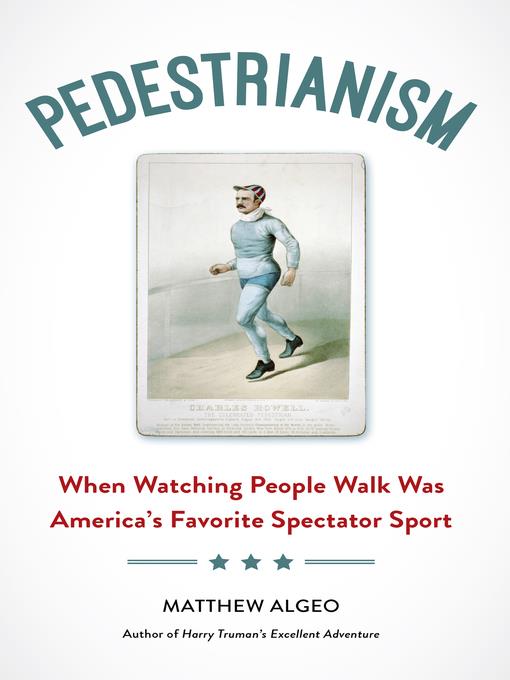
Pedestrianism
When Watching People Walk Was America's Favorite Spectator Sport
فرمت کتاب
ebook
تاریخ انتشار
2014
نویسنده
Matthew Algeoناشر
Chicago Review Pressشابک
9781613744000
کتاب های مرتبط
- اطلاعات
- نقد و بررسی
- دیدگاه کاربران
نقد و بررسی

February 15, 2014
A lively account of America's first major spectator sport, competitive walking, which attracted thousands in its day. "It was like watching a NASCAR race in super-slow motion," writes reporter Algeo (The President Is a Sick Man: Wherein the Supposedly Virtuous Grover Cleveland Survives a Secret Surgery at Sea and Vilifies the Courageous Newspaperman Who Dared Expose the Truth, 2011, etc.), "hypnotic, mesmerizing, with the promise of imminent catastrophe." Competitive walking began when bookseller Ed Weston bet that he could walk from Boston to Washington, D.C., in 10 days to attend Abraham Lincoln's first inauguration. He missed the president's oath by a few hours, but his feat of footwork launched a new spectator sport. In epic rivalries, treks of more than 500 miles in six days (there were no competitions on the Sabbath) were common as pedestrians left the public roads and walked in circles in venues like the first Madison Square Garden. The mania to see competitive ambulation soon became a phenomenon in England, as well. While the American style demanded "fair heel and toe" (part of one foot on the track always), the Britons allowed "go as you please" (run if you like). However, sporadic runners usually could not keep up with steady walkers. Walking events spawned trainers, trading cards, endorsements, scalpers and, not surprising considering the betting, fixes. There were also widespread charges of doping--in particular, the chewing of coca leaves. Sportswriting flourished, and sports medicine was born. Women began walking, followed by African-American pedestrians. Soon, the clergy denounced the whole business. Ultimately, pedestrianism, an attraction of the Gilded Age, was replaced by six-day bicycle racing, boxing and the new national pastime, baseball. The world-class practitioners of the trudging art and their sport were soon forgotten. Algeo brings them back to life. An entertaining biography, step by step, of a diversion in the earliest days of today's sports industry.
COPYRIGHT(2014) Kirkus Reviews, ALL RIGHTS RESERVED.

May 15, 2014
This book offers a fascinating take on what was once "America's favorite spectator sport." While the word pedestrian is today often taken to mean lacking in excitement, pedestrianism was anything but--this "walking for sport" became a sensation in late 19th-century America. Algeo's tales of this long-forgotten pastime begin with a wager between two gentlemen betting on the outcome of the 1860 presidential election. The loser of this bet, Edward Weston, predicted that Abraham Lincoln would not win. The terms of the bet were that the loser would have to walk from the State House in Boston to Washington in time to see Lincoln's inauguration. Weston took on the challenge and missed the mark by only a few hours. However, despite this defeat, Weston launched a career showcasing his ability to walk long distances. His efforts also saw the beginning of a captivating new American sport that was more wholesome than betting on "blood sports" and more enthralling than "posh pursuits," such as yachting. Weston's foray into walking for sport also attracted other famous competitors, including women. The enthusiasm of the American people for the sport led to more robust challenges, many of which Algeo has carefully researched and documented throughout. VERDICT The overall writing style is captivating and treats its obscure subject matter with zest. Readers interested in lesser-known aspects of American history and tradition will be fascinated with the stories of the major players of this oft-forgotten pastime.--Annette Haldeman, Dept. of Legislative Svcs., Maryland General Assembly, Annapolis
Copyright 2014 Library Journal, LLC Used with permission.

























دیدگاه کاربران